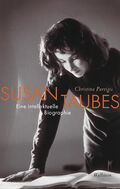An Intellectual Biography of the Writer and Philosopher Susan Taubes (1928–1969). A Study of the Paradigmatic Significance of Her Life and Work in the 20th Century
 The aim of this project was an intellectual biography of the writer and philosopher Susan Taubes (1928–1969), one that went well beyond a simple reconstruction of her life and instead revealed it to be a historical experience paradigmatic of the 20th century. As a Jewish émigré moving between Europe, Israel, and the U.S. and as a female intellectual oscillating between art and academia, her biography demonstrates the inextricable nature of exile and homelessness.
The aim of this project was an intellectual biography of the writer and philosopher Susan Taubes (1928–1969), one that went well beyond a simple reconstruction of her life and instead revealed it to be a historical experience paradigmatic of the 20th century. As a Jewish émigré moving between Europe, Israel, and the U.S. and as a female intellectual oscillating between art and academia, her biography demonstrates the inextricable nature of exile and homelessness.
The project drew exclusively on Taubes’ literary legacy—her manuscripts, diaries, and letters, which not only document an extraordinary network of intellectual encounters (e.g., S. Sontag, A. Camus, and E. Lévinas) but further illustrate a life and career marked by political violence and permanent transit. The systematic reconstruction of her literary legacy created a space for debates on topics largely unacquainted with one another, such as figures related to the ‘escape to life’ (Goebel/Weigel) and a ‘literature of no fixed abode’ (Ette).
Previous research on Taubes’ legacy had demonstrated the relevance of her work to contemporary issues, not only in regard to the role of religion in modern times but also in terms of questioning concepts of identity and biography. The latter concepts greatly influenced the direction of this project, which avoided a mere overview of the writer’s life in favor of an in-depth illustration of her emotional struggles with loss and alienation as reflected in her writing. It explored the complex interactions, interrelations, and intertextuality found in her works and beyond; in her personal encounters, individual fate, the writings of contemporary authors, and historical discourses. Thus, this study demonstrates how the complex experiences of the 20th century influenced the production of literary and philosophical works.
A topographical grid of Taubes’ known whereabouts formed the basis of the project. Budapest, New York, Jerusalem, Paris—how did these cities influence her intellectual and artistic works? To what extent was her movement between different locations and languages and between her position as an artist and a philosopher constitutive of her life’s work? These specific places served as historical and symbolic contexts for the writer’s individual experiences—contexts that opened a horizon of her intellectual contributions. This horizon spanned the search for a sense of belonging despite her ambivalent attitudes towards Jewish tradition and her literary and philosophical reflections on concepts of identity, which had become problematic after the Second World War and the Shoah.
Fig. above: Susan Taubes (1928–1969)
see also
- Susan Taubes Edition (project 2008–2014), multi-volume edition of the writings of Susan Taubes (ed. by Sigrid Weigel) with mostly previously unpublished material from Taubes’ estate
- Christina Pareigis: Susan Taubes – Bilder aus dem Archiv, in: Trajekte 20 (2010): Aus Berliner Archiven, 22–29
- ___.: “Creation is always violent”. Susan Taubes an Jacob Taubes, Zürich, 4. April 1952, in: Trajekte 15 (2007): Pathos, Bilder, Religion, 6–15
Publications
Susan Taubes
Eine intellektuelle Biographie
Christina Pareigis
- Vom Eigenleben der Hinterlassenschaften. Zur Verzeichnung des intellektuellen Lebens und Schreibens von Susan Taubes, in: Daniel Weidner, Falko Schmieder (eds.): Ränder des Archivs. Kulturwissenschaftliche Perspektiven auf das Entstehen und Vergehen von Archiven. Berlin: Kulturverlag Kadmos 2016, 161–176
- Außerhalb von Chronos’ Familienalbum. Die Zeugnisse der Schriftstellerin und Philosophin Susan Taubes, in: Esther Kilchmann (ed.): arteFrakte. Holocaust und Zweiter Weltkrieg in experimentellen Darstellungsformen in Kunst und Literatur. Wien, Köln, Weimar: Böhlau Verlag 2016, 183–194
- Hinterlassenschaften/Remnants, in: Trajekte 30 (2015): Schlüsselbegriffe der Kulturwissenschaft/Key Concepts of Cultural Science, 40–51
Events
Christina Pareigis, Sigrid Weigel: Überall im Exil: Susan Taubes
silent green Kulturquartier, Gerichtstraße 35, 13347 Berlin
Susan Taubes: Der letzte Tanz und andere Erzählungen
Literaturhaus Berlin, Fasanenstr. 23, 10719 Berlin, Kaminzimmer
Ins Deutsche übersetzt von … Werner Richter
Literaturhaus Wien, Seidengasse 13, 1070 Wien (Österreich)
Christina Pareigis: pas sa sosie. Susan Taubes und Susan Sontag: Spuren einer intellektuellen Freundschaft
ICI Kulturlabor Berlin, Christinenstr. 18/19, 10119 Berlin, Haus 8
Media Response
Radio review by Hans-Peter Kunisch, in: WDR 3 Buchkritik, 23 Mar 2021
Ringen um die Notwendigkeit des eigenen Daseins: Die erste Biografie der Schriftstellerin und Philosophin Susan Taubes.
Review by Johanna-Charlotte Horst, in: Süddeutsche Zeitung, 04 Mar 2021
Susan Taubes war viel mehr als die Frau von Jacob Taubes. Jetzt erscheint die erste Biografie über die Religionsphilosophin und Schriftstellerin, die ein Kultbuch über Scheidung schrieb. Review by Charlotte Szász, in: Die Welt (27 Feb 2021), 27
Review by Silvy Pommerenke, in: Aviva. Online Magazin für Frauen, 15 Feb 2021
Review by Thomas Meyer, in: Frankfurter Allgemeine Sonntagszeitung 5 (7 Feb 2021), 34
Review by Magnus Klaue, in: Frankfurter Allgemeine Zeitung 24 (29 Jan 2021)
Radio review by Carsten Hueck, in: Deutschlandfunk Kultur, program Lesart, 21 Jan 2021
Review by Hans-Peter Kunisch, in: Philosophie Magazin 56.2 (2021) (fee required)
